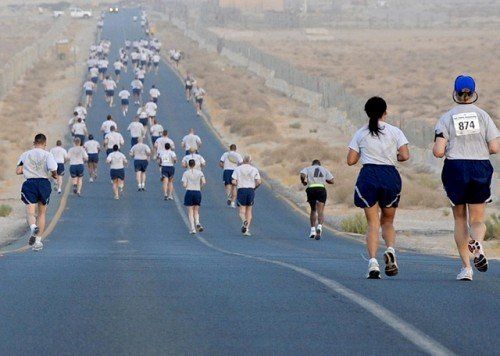What is sport for? Does it exist to keep participants fit and well? To provide spectators with excitement and escape from hum-drum lives? To provide points of contact with our culture? Or is there more to it than that?
Certainly this last year has brought us many exciting sports events and moments: the football World Cup, the Commonwealth Games, motor racing, and test cricket on our doorstep.
Who could fail to admire David Beckham’s match-winning goal, scored from an astonishing free kick in the dying moments of a World Cup qualifier? Or Paula Radcliffe and Jonathan Edwards winning gold-medals at last at the Commonwealth Games?
But, for a moment, let us step back from it all to consider what should be a truly biblical view of sport for the Christian — not just for the athlete but for any of us.
Training
Sport figures mainly in Scripture as a metaphor for Christian discipleship. For example, 1 Corinthians 9:24-25 says: ‘Do you not know that in a race all the runners run, but only one gets the prize? Everyone who competes in the games goes into strict training. They do it to get a crown that will not last; but we do it to get a crown that will last for ever’.
It is commendable to employ such verses in our witness — to point people away from the transient rewards of this world towards the true and eternal riches of Christ. But to find support for actual sporting endeavour, we must look to other Scriptures.
The first helpful statement is that physical training is of ‘some value’ (1 Timothy 4:8). In context, Paul’s intention was not to emphasise physical activity, but to contrast it with something of even greater value — godliness! Nevertheless, the apostle does tell us that bodily exercise ‘profits’ us.
Conversant
The fact that the New Testament writers used the imagery of sport so frequently is significant. Further examples are Romans 9:16; 1 Corinthians 9:26; Galatians 2:2; 5:7; Philippians 2:16; and Hebrews 12:1-2,12-14.
Many New Testament references to ‘fighting’ and to receiving a ‘crown’ may also envisage the sporting arena.
Since these verses refer exclusively to the best of spiritual endeavour, the writers must have approved these aspects of sport. Clearly, the apostles were not only fully conversant with the world of sport, but expected their readers to be also!

A final significant statement is that believers’ bodies are the ‘temple of the Holy Spirit’. If this is so, we should be wise and responsible stewards of them (1 Corinthians 3:16). This verse is of direct significance for our subject, in the following ways.
Self esteem
Firstly, to look after our bodies we must combat the adverse effects of modern lifestyles. The modern workplace, labour-saving home and motorised transport provide insufficient opportunities for exercise.
Most of us need to build more exercise into our daily routine. According to Gary Zoela in The Creationist Diet, exercise reduces blood pressure, heart rates, blood cholesterol and stress levels. This in turn reduces the risk of heart attacks and strokes.
He adds: ‘Exercise, combined with proper dietary changes, is the only truly successful way to lose and maintain body fat losses. It also improves physical appearance, self-esteem, mental and intellectual awareness, and general well-being’.
In practice, to make our exercise both more pleasurable and sociable, many of us will turn to sport.
Danger areas
Secondly, to be responsible stewards of our bodies, we should avoid sports that are damaging or dangerous. This is a relative issue — life-threatening injuries sometimes occur in normally innocuous sports such as football and cricket.
But the risk of death is much higher in mountain climbing, motor-racing and extreme skiing, while boxing has a high incidence of brain damage. Even spectators of such sports may be adversely affected. For example, speeding motorists on the roads often imagine themselves to be Formula 1 racing drivers! Caution is required in these areas.
There are other guidelines and cautions. Ecclesiastes 4:4 says: ‘All toil and all skill come from a man’s envy of his neighbour. This is a vanity and a striving after the wind’.

Here we are warned of the motivation behind much competitive spirit — human pride and a desire to overcome one’s neighbour! By contrast Scripture encourages us to love our neighbours and deem them better than ourselves.
Mammon
Moreover, we are to guard against ‘mammon’ (1 Timothy 6:10). Money and sport are intertwined, and Christians can easily be caught up in a culture of greed. The big sports companies vie with one another to win sponsorship deals.
At the Commonwealth Games opening ceremony, no one could miss the glittering Adidas designer label embroidered on David Beckham’s track-suit top as he took the Jubilee baton to the Queen. And around one billion people are thought to have been watching!
Whilst sponsorship benefits sport, there are also losers — the individuals and teams who cannot win sponsorship.
Many American and Australian athletes are now professionals, with lucrative support. But without such support, it is impossible to compete on an equal basis.
The professional gains full-time training, top coaching input, excellent facilities and equipment (of crucial importance in sports such as cycling).
Take the example of women’s hockey at this year’s Commonwealth Games. The professional Australians completely outclassed amateur teams. How demoralising to be a Malaysian player losing 18-0 to the Australians!
In contrast, we should note that God has compassion on the poor, and raises them from the ash-heap (Psalm 113:7). The British Government does provide some sports funding for Commonwealth nations, but the paucity of representation from the poorer countries (many of which have large populations) suggests that we remain far from the ideal of ‘common wealth’!

Shaping culture
Competitive sport has its merits, however, in perfecting skills for activities that can then be enjoyed for more relaxed recreation. A good example is sailing. Racing gives the sailor experience at fine-tuning the trim of the sails and optimising his course.
But Christians need to beware of the morass of money-competitiveness-advertising-fashion-oriented sport.
God has given some of us the body and skill, and has placed us in a relatively rich society with all its opportunities. Most important of all, those he has called to participate in sport bring the fragrance of Christ with them as a testimony to an ungodly age.
But we must not be swept along by a godless sporting world. Christians have shaped culture down through the centuries, and should continue to do so.
Perhaps the key is to rediscover the riches of recreation, with its implied biblical root (re-creation!).
The world has utterly secularised the notion of recreation, just as it has turned the ‘holy day’ into a holiday (not that I advocate never taking a holiday! But ‘holidaying’ has become for some an industry; for others a way of life; and for yet others the chief goal for which they work).
As gold-medallist Mary Peters commented recently, competitors today are under so much pressure to produce results, having to train to amazing fitness levels and to be so ruthless, that ‘it is almost impossible to enjoy [sport] as recreation’ (Daily Telegraph, 26 Aug).
Recreation
Recreation for the Christian should provide a means of rest, invigoration and restoration. Perhaps, too, it can bring us a deeper appreciation of his creation and its riches, inspiring awe and worship. The psalmist made many detailed observations of God’s universe. He saw the ‘Designer Label’ on all the garments he has made (e.g. Psalms 19 and 104).

Above all, recreation should bring us closer to God himself. It is he who renews our strength and vigour (Isaiah 40:41), and we need time apart with him to direct our steps.
I was one of the fastest cyclists in Britain, but when I became a Christian the competitive fight in me just seemed to fizzle out! The most beautiful moments in sport for me have been cycling and canoeing with our young family.
Another such moment was an encounter with a magnificently coloured clownfish when I was scuba diving in a coral sea. The fish swam up to me, and studied me with a prolonged, intelligent gaze. He seemed to be painting a picture of me in his mind, as if he were an aquatic Rembrandt!
Hero
And who are our sporting heroes? One of mine is the man who, to the astonishment of the crowd, continued running after winning his race. Failing to stop to collect his medal, he ran straight out of the stadium.
The man was Olympic gold medal winner Eric Liddell, and he had a ferry to catch that day to return to his missionary work across the sea.
When he arrived at the landing stage, to his consternation the boat was already pulling away, and Liddell was faced with a quick decision. Could he make a literal leap of faith?
He continued to run, took an enormous leap off the jetty, over the water stretching below him … and landed on the ferry!
What a beautiful picture of the Christian athlete, where the medals just did not matter because he had God’s work to do! Yet his sporting prowess and faith worked together in harmony.
Perhaps that is the way forward for us also.



